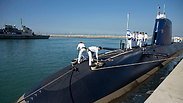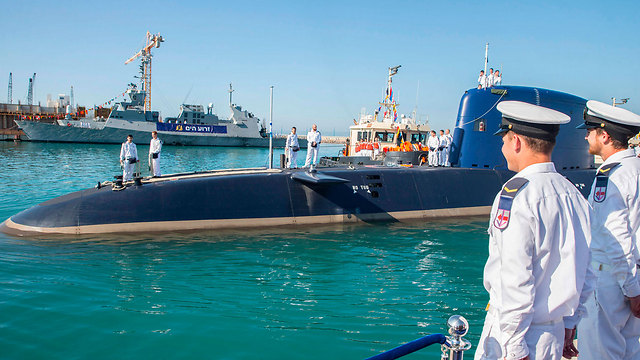
How did the Israeli political echelon reach a decision to massively expand the submarine fleet?
צילום: AP
Hysteria over Iran created convenient avenue for corruption
Op-ed: It’s impossible to understand the unbearable lightness of making submarine purchase decisions, as well as decision-makers’ blindness to suspicious background noises, without seeing the external cause: ‘Iran’—the magic word silencing criticism, discouraging those who raise doubts and justifying moves that violate rules and regulations.
Some years ago, I was invited to a conversation with a senior official. A very senior official, who was in the middle of a transit period between one high-ranking position and another. We spoke about this and that, and the man wouldn’t stop criticizing the government at the time and its leader.

At some point, the Iranian issue was raised. Israel, I was told by the man who had just taken a break from crucial decision making, won’t succeed in restraining Iran’s military nuclear aspirations just by talking, or even by enlisting international support for a comprehensive economic boycott. Iran, he ruled, must be militarily deterred.
How? I asked. By creating a proven ability for a second and even third military blow, he replied. The leaders of the Iranian state must know, he went on, that a nuclear attack on Israel would lead to an Israeli response that would wipe off the face of the earth not only wide parts of the city of Tehran, but wide parts of all of Iran, including its main infrastrctures. “It is only under this threat,” he explained, “that they will agree to completely stop arming themselves with nuclear weapons, and they won’t dare use it in any event, just like Stalin avoided using it.”

INS Rahav submarine at Haifa Port. Turn the spotlight on the Iranian corner, and a lot of things become clear (Photo: AFP) (צילום: AFP)
Troubled by the senior official’s strategic perception, I asked him in the next background meeting how would Israel guarantee its ability to deal Iran a second and even a third crushing blow.
“Think about a submarine fleet,” the man said knowledgeably. ”Why don’t we invest in a fleet of submarines capable of reaching distant seas and launching missiles carrying nonconventional warheads from there? It’s obvious that submarine purchases, as opposed to sophisticated but small-scale purchase deals, will be made public and serve as a signal and warning sign to Iran’s leaders.” And what about the price, I asked. “A reasonable price,” the man replied. “About 10 to 15 billion shekels. With this money, we’ll overcome the Iranian nuclear threat.”
I recalled those conversations as I was reading about the latest developments of what is known as “the submarine affair.” Reading about it made me wonder: How did the Israeli political echelon reach a decision to massively expand the submarine fleet? How did a vast network of corruption develop around the decision and the decision-makers themselves, with them ignoring this as if it were a minor nuisance? How did a raging river of tainted money flow by their side, and they didn’t stop to wonder, ask and show an interest in the source of the dirty drops? I wondered and wondered until the Iranian deterrence theory, as it was presented to me by that senior personality, popped into my mind. And now, I realized, it’s being fulfilled before our eyes, and its fulfillment overshadows everything, minimizes everything, is forgiving towards everything.
It’s impossible to understand the unbearable lightness of making decisions to purchase submarines, even at a reduced price, as well as the decision-makers’ blindness to suspicious background noises, without seeing the external cause—Iran, Iran and Iran. “Iran” as a magic word silencing criticism, discouraging those who raise allegedly marginal doubts and justifying moves that violate rules and regulations. The hysteria over Iran (which is well-established in itself) created a convenient avenue for deals, for wheelers and dealers and for corrupt and corrupting middlemen.
For that same reason, to bring some logic into the picture, some people are searching for a link between the submarine affair and the natural gas discoveries. And where might this link be discovered? Not in the gas prices, not in the gas plan, not in the competition over gas, but in the defense of what is known as Israel’s exclusive economic zone, where the natural gas drillings are (also) taking place. The Air Force and Navy, however, could have and can defend this zone without considerable investments in new purchases—and everyone knows that. There is no reference scenario in which a Hezbollah submarine takes over the Tamar gas rig.
Remove the Iranian military nuclearization threat and the effort to prevent it from the equation, and the submarine affair suddenly turns into a sort of theater of the absurd, an insignificant scamper of actors and extras on the Israeli government’s stage with its ranks, associates, spokespeople and advisors. Turn the spotlight on the Iranian corner, and a lot of things become clear. As the known proverb goes: Where trees are felled, chips will fly. But who cares? It’s natural, after all. Isn’t it?










